|
|
| 'Like' us on Facebook | Follow us: |
Posted on: Feb 19, 2013
A Life of Servitude
- an exclusive conversation with Mr. K. Chakravarthi
PART 3
Trusting the Trust after the Mahasamadhi
KM: That's reassuring to hear. But there's a question on people's minds. These are great projects and this is good news, but ever since the Mahasamadhi has there been any drop in the contributions coming from devotees to support these projects?
K. Chakravarthi: You see it is expected, I suppose. Anything which is so huge as the Mahasamadhii is not merely a transition... it is historic.
It is something of a totally different nature. Now, it takes time for people as they have their own response mechanism. Some are able to come out of it quickly, some take a longer time, some feel that if there is no presence of Swami, what is there in that place. Some feel that visiting a place itself is really going to give them a sense of being close with Swami. Human beings differ in their responses, their reactions, also in the time for recovery.
So I think given the fact that it is a huge difference between having Swami in His physical form and not having Him; it is traumatic for many people, it's not easily explained. I think those who have gone through as the devotees would understand what I say because what has affected me must have equally affected everyone.
KM: And grieving is a process.
K. Chakravarthi: That's why I said some people are able to get over that faster than others. Some people perhaps are thrown into situations they find extremely difficult to get out of. But I'm sure with Swami giving them the necessary strength to get over, it's a question of time. So any fall in the people's contributions towards these, yes I think is understandable. But I do think that when people see that these activities are carried on in the same spirit of service.
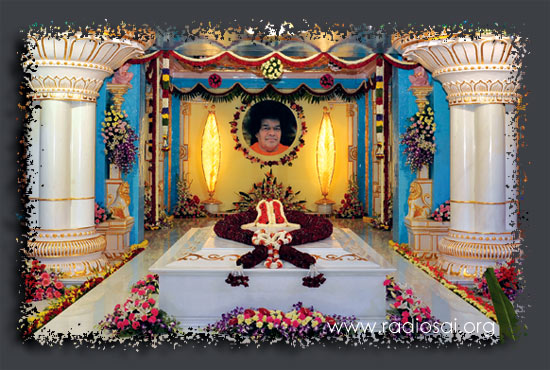 |
KM: With further growth and expansion happening...
K. Chakravarthi: Yes. Look at the way in which the hospitals' work is going on for the last 18 months, for instance; there is no drop in any figure. All parameters, in fact, have registered a slight increase. Look at the university. Look at the faculty, look at the students. No way is the commitment to the cause of higher education now less than or in no way is that commitment to Swami, His ideals, His mission, less.
I think Swami’s mission is not defined by His physical presence alone. That is yes a very important thing; it has been especially for us, this generation which has been contemporary of the Avatar but I don't think we can circumscribe Him, to this limited period of time. If you look at the general span of time, the physical existence of any person, even the divine manifestation, is limited. It could be decades but not centuries.
If you look at the institutions that have been built by them or by Him especially, I do not think a second of this nature is there in the history of humanity.
But if you look at the certain institutions which have been growing over centuries... clearly, these hospitals, this university, etc., will have a time span of centuries. So if the divine manifestations limited itself to a few decades, the institutions which embody His spirit will last for centuries. And if it comes to a question of His message, it will be for eternity. It is timeless. Therefore, to think of these things in a timeframe with which you are accustomed is not correct.
KM: Very myopic indeed.
K. Chakravarthi: So I'm sure these institutions will continue to inspire generations of people to come. And I think people would like to be a part of that great endeavour, that history, that tradition of service. I think these institutions will be a rallying point for many, many people to come. And we believe that there will be a connection which Swami will establish between Himself and the successive generations that come to inhabit this world.
Sustaining the Central Trust's Vibrancy and Perpetuity
KM: Now a more mundane question. What happens if a member of the Central Trust chooses to retire? Is there a mechanism within the Trust to ensure perpetuity and induction of new blood?
K. Chakravarthi: As it happens in Trusts, the existing trustees will have to propose and if it's approved by the people concerned, then invitation is sent to the person concerned to join the Trust board. This is like any other Trust or any corporate body. So when a situation arises, when there is a need for somebody to be inducted, a process of that nature would come into existence.
We should be in a position to think amongst ourselves who could be invited and of course we also should know about his willingness to serve. These are normal things which happen everywhere and depending on that, we will have to take a decision about formal induction and then extend it by invitation and then welcome him to the Board of Trustees. I think these are processes which will come.
KM: Will it always be a ‘him’?
 |
 |
 |
 |
 |
 |
 |
 |
| Mr. Chakravarthi participating in the convocation ceremony as the Registrar of Baba's University | |||||||
K. Chakravarthi: If you look at even the Council of Management which was there when Bhagawan was a sole Trustee, Rajmata was there as a member of the council; she was a very venerable person. And then we had Justice Padma Khastagir from the Calcutta High Court. So it is not as though Swami has made any sort of hard-and-fast rule that men alone can be... I don't think. And even if you take the governing body of the University, a distinguished Vice Chancellor lady would come there.
So as far as the Trust is concerned, I think gender will not be a factor because if you go by history, the way in which Swami Himself has inducted the Council of Members when He was a sole trustee would be a pointer.
KM: That's excellent to know. Now at the time of the Mahasamadhi, we saw the whole world descend into the valley of Prasanthi Nilayam but a few months later, there appeared to be a drop in the size of the congregation. Did it worry the Trust at any point in time?
K. Chakravarthi: It is not a matter for Trust alone because as I said, it takes time for people to rebuild their lives. You see, when a thing of that nature happens like Mahasamadhi, people consider it as the last sight of the physical frame. Now that cannot be compared with normal days when people come and go. So that was I think the last homage paid to... the physical expression of divinity.
So that was a totally different thing. That's why you would have seen that for hours together people marched past, filed past….
KM: Lakhs and lakhs for three days.
K. Chakravarthi: And these are people from rural areas, mostly; some of them from semi-urban areas, etc. Many of them might have come off and on but then, that occasion must have brought them because it is a question of being the last time to see. Therefore, that itself shows that these are the people who are going to be the vast assemblage of devotees.
 |
 |
 |
 |
 |
 |
 |
 |
Coming here need not perhaps be an expression of their devotion from their point of view. We can still carry Bhagawan in our own hearts, we can stay at home, we can pray. So, there are other ways in which this expression or devotion can come. But I think as years go by, there will be a natural yearning in the hearts of many to come and breathe the air that He breathed, to tread the soil He trod and to hear the music and it is not the conventional music – it will be the music of the spheres.
KM: Very true. Elevating and divinely inspired music!
 |
 |
 |
 |
 |
 |
 |
 |
K. Chakravarthi: So I do not think the fall in the number of people coming can be attributed to any factor except people having to come to terms with such a loss. And we do not know much about other places but take Shirdi for example. People say that there were very, very few people who had been going to Shirdi for decades after the Mahasamadhi. But in the last decade or more, lots of people visit the shrine, and to attribute it to any reason such as religious tourism would be rather naïve.
KM: And even irreverent.
K. Chakravarthi: But I think this can be attributed to the way in which the glory of that manifestation had touched the hearts of people. So, there is reason to feel that a similar outpouring of feelings by way of having to come and be a part of this place would also naturally manifest itself when Sathya Sai wills and decides.
KM: Everything happens as per as His game plan.
K. Chakravarthi: It will happen.
The other place that comes to mind is Tirupathi where people over a period of time have felt, possibly in their own hearts and minds, something very comforting, very soothing, something which has really made them connect with some power which they can't describe but they can experience within. And I think during the life time of Swami, He has done that - touching the hearts of many. So, when will that express itself once again in the lives of these people, will be a factor.
For people who have not seen Him at all, how would it express itself is a matter we may not be able to comment upon. I think this has to be left, this is in the bosom of time, but I think time will reveal at sometime.
Personal Journey: from IAS to SAI
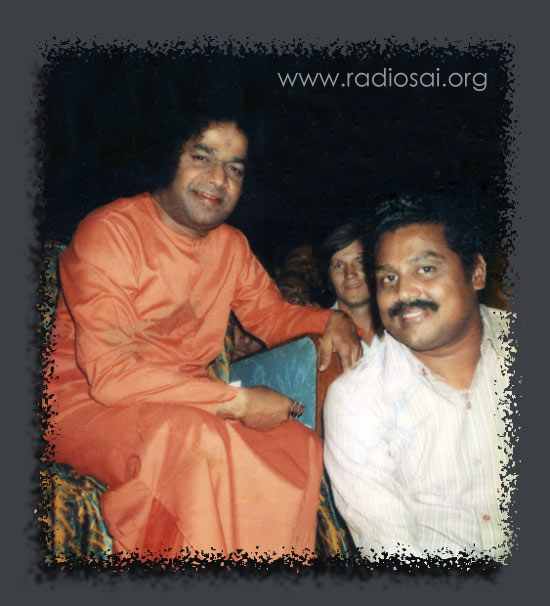 |
|
| Soon after his first visit, the longing to serve Bhagawan intensified |
KM: Yes! At the right time as it did with everything that unfolded throughout Bhagawan's life.
Sir, you spoke of touching the hearts. So let's just change gears here. Obviously, Bhagawan touched your heart in 1975 and you decided to quit a very secure professional life when you were at the top of your game.
Undoubtedly, you could have gone places had you stayed in the profession that you had worked so hard to get into. Instead, you made that life-altering detour and you came to serve a master and it is actually very hard for people to believe that you live a very modest life in a 10 feet x 12 feet room for years now. At any point in time did you wonder, did I do the right thing?
K. Chakravarthi: I never questioned myself whether I did the right thing because I think deep down in me when I came here, I knew that it is the right thing.
KM: How were you so sure?
K. Chakravarthi: Because I never had a feeling that I have lost anything. I mean even if you look at it in material terms, I came to Swami for the first darshan in '75. Now when I was transferred to Hyderabad, Swami gave us a huge building.
KM: I believe a former palace.
K. Chakravarthi: Yeah, it was some Nawab's palace which Swami had bought and we started the school there and it was a huge place with Swami's grace. He made my wife as the Director and Correspondent at the school and He said that it would be good if she stays somewhere here because otherwise time is lost in transit. And Swami told us that “Until now you have lived in rented government accommodation; you are living in your own house now.”
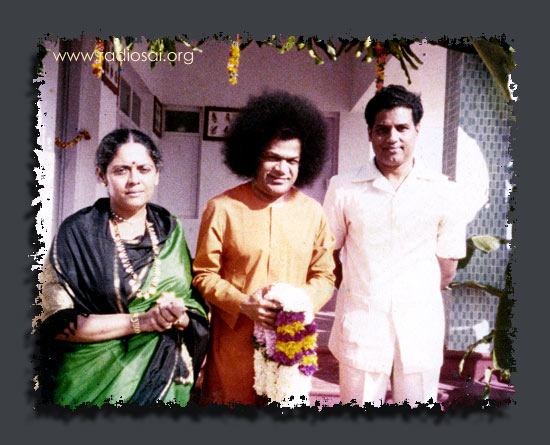 |
|
| Mr. & Mrs Chakravarthi with Bhagawan outside their new official residence |
KM: And He came and stayed with you twice in that house!
K. Chakravarthi: Yes He did. So that's the reason why I think we never felt that as though we had lost something; we have gained and I mean even in material terms. Then when we came here, and it took quite a bit of time for Him to give me permission to leave (government service) and come. And when He finally gave His permission to come and I joined as a Registrar, He built a house separately and I think it was a beautiful house...
KM: Yes, where the Sri Sathya Sai Mirpuri College of Music is located now.
K. Chakravarthi: That building is no longer there but it was a very fine place, very roomy, airy, everything that one could think of. I think I would not have been able to construct a better house than that; that is what Swami gave and I think He not only gave a house to stay, He also dropped in occasionally to be with us there. And more than that I think that was the first time both my children stayed together. You see, the first son was studying somewhere and the second son was studying; that was the first time when both the children could be together because they were students of this university.
If I had been working somewhere else, I suppose they would have gone to different universities or different places. And when the children were there or even when they left, Swami said that every day it was my responsibility at the time to visit the hostel and I used to be there after my dinner between 8:00 and 9:45 at least, because then the bell goes and they have to go for the night prayer. So I normally used to be there between 8:00 and 9:30 PM, invariably every night of my stay in the university.
 |
 |
 |
 |
 |
 |
 |
 |
| Bhagawan visiting the Chakravarthi residence that He specially constructed for them | |||||||
And I think I knew many of them personally and I suppose one reason I did not miss the children was because I was in the midst of all the children there – from the undergraduate to the postgraduate, and the research scholars.
So, I think it was the ambience there that gave you a feeling that you are a part of the very large family where the children grew up; usually you get so much delight in seeing them grow and by knowing their background; of course, Swami knew the background of everyone I suppose and He used to ask me “Did you see this person, that person, that boy, this boy?” I mean it was always necessary for me to keep knowing these boys, not as well as Swami would know them but at least as well as I should.
Serving Beyond the Call of Duty
KM: And you have an incredible memory. You remember almost every person's batch and year of graduation.
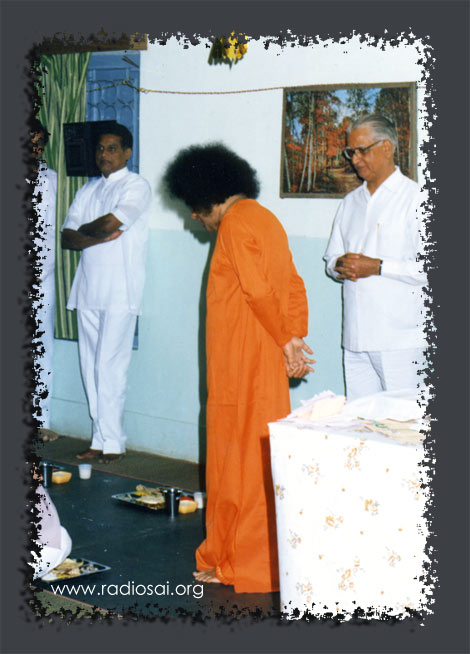 |
|
| The divine Chancellor visiting the hostel, flanked by the Vice Chancellor, S. N. Saraf and Registrar, K. Chakravarthi |
K. Chakravarthi: Well that was again because of the need to report to Swami I suppose. I may have had a fairly well-endowed memory but Swami used to show His concern for the children because boys would write letters to Him saying that they are unwell or the father is not well, the mother is not well or something.
So I used to go into His room and He would say, “Ah, did you see this boy?” So I used to really make a point to go and see the sick boys so that I got to know who is down with what sickness. So even before Swami asked I would say “Swami, yes I saw these people. These are the boys since past three days, four days, and this is what happened – basically report on each day of the student’s illness.” So the idea was not that Swami cannot know. This is more a question of all the functionaries in this organisation knowing as much as they ought to, about the well-being of the students.
KM: And I can't think of any university where the Registrar goes to the hostel and bonds with the students.
K. Chakravarthi: That is because of the extraordinary close connection between the Chancellor and the students.
The Registrar has to maintain at least at the physical level, not at perhaps the heart level which Swami used to but at least at the physical level I should know. I took great pleasure also in doing so; I never considered it as a great responsibility. It was so natural to me; I would know the grades of almost all of them. I would know who were the outstanding graders.
And that is also because of my desire to know as many as possible and be of some help to them. I don't think any Registrar of any university will have this because the warden of the hostels in conventional universities may have a great rapport with the students as their pupils.
But here Swami would know not only the student but also the grandmother of the student or the grandfather or the father or the uncle. The whole thing was something like a great family in which you have some little role to play to help them, to be of use to them and to bring it to the notice of Swami, which I think was very important. Not that He is not aware but I think it is also the responsibility of the functionaries to keep Swami, in His capacity as the Chancellor of the University, informed of the welfare of the students.
So I enjoyed that. It was good. Looking back I think that has kept me young. In mind, I never felt old because I was in the company of the young growing children.
Bonding with the Divine Chancellor
KM: I recall as a student watching our first Vice-Chancellor Dr. V. K. Gokak and yourself make a beeline to Bhagawan's personal quarters before every darshan.
K. Chakravarthi: Yes, He had given us a time. In those days, early days of the university, our time was 6:40 to 7:20 AM the morning.
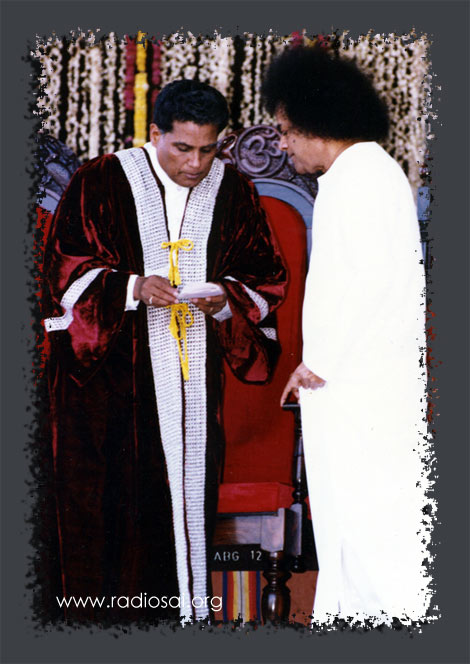 |
|
| Reporting to the divine Chancellor as Sai University's first Registrar |
KM: And then again in the afternoons!
K. Chakravarthi: Yeah! At 6:30 PM, I used to come; together the Registrar and the Vice-Chancellor used to go up and keep Him informed of what had happened the previous day. And in the early days Swami was very keen to know everything – about the Governing Body, structure, work, Academic Council, the Boards of Studies, the way in which people are recruited and often times He used to come and sit in the Selection Committee during the selection of a professor or reader and things like that.
His presence made everybody take it as seriously as one should. Even otherwise one would have done it perhaps because of a certain professional interest but His presence endowed all these proceedings with a certain not only seriousness but also with a sense of commitment. When Swami could spend so much time building up the institution, all the concerned people should equally give that much time. So this is how everyone felt during the early days of the university while the infrastructure was still being built up.
And I remember when I came here to start my work as Registrar, there was no stenographer in the office and I had to go back to my old times as a student to write in longhand whatever notes I had and then get them typed. So it was something totally different from what I was accustomed to – having two or three stenographers around and I would dictate work and felt that I have done the day's job. Here I was supposed to take some white paper, write in longhand and giving it to one typist and he still had to get a new typewriter at that time. Looking back, there was a great sense of growing in those days, in a new atmosphere and we are part of the great history.
KM: Of course, one day, looking back, people will scarcely believe this actually happened.
K. Chakravarthi: The commitment to every small little detail, is what people working in any capacity with Swami would have developed. That's why I think anybody would carry that as part of their tradition ... whatever commitment they want to give in their life, they would certainly like to take upon themselves this great responsibility to attend to every bit of detail.
That's why I feel that these institutions which Swami has built almost every day of His stay here with us – they can't be taken lightly by anyone. So today or tomorrow or even day after, I am sure people are going to look at them as the visible embodiments of that everlasting spirit.






